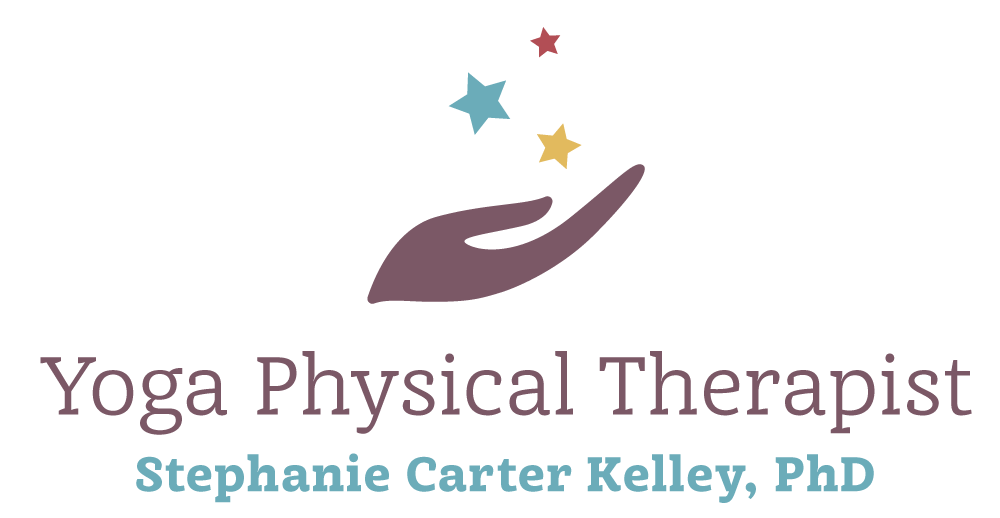Most people that come to see me believe that their low back pain is related to an old injury or pathology that was shown to them on X-Ray or MRI. But research tells us that chronic back pain is not a result of an old injury or pathology. Let me repeat…chronic back pain is NOT the result of an old injury or pathology in the spine such as a disc herniation or arthritis.
I know you’re thinking: “Wait! What?!? My physician (chiropractor, physical therapist, or other healthcare provider) showed me the X-Ray or MRI! Were they lying to me?”
No, but they may not be keeping up on current research in chronic pain. Recent research shows that addressing the brain, and not the body, leads to a decrease in pain (see Why Things Hurts on my Resources page). Research also shows that people without pain have the same pathology of the spine as people with pain (see another blog post: Why Yoga for Back Pain?).
So why the difference? Why do some people have chronic back pain with degenerative discs and joints and others do not?
The reason lives in the brain, i.e. your beliefs about pain; how you responded emotionally to your original injury; how you respond to your pain; how your loved ones responded to your injury and your pain. Just as we develop habits of thought and behavior, we can develop habits of pain.
Now this doesn’t mean that you don’t also have physical impairments associated with pain. Your pain has limited your movement and physical activity, so now you have stiffness and weakness. I also believe we have both physical and psychosocial triggers to “incite” pain. So an approach that includes BOTH physical function like movement and strengthening AND brain training like mindfulness and motor imagery is the right choice for people with chronic pain.
My approach to Yoga for a Better Back uses the biopsychosocial model of health for healing chronic pain:
· Bio: learn how to move and increase core strength with respect for the pathology
· Psycho: learn how your thoughts and emotions keep you in pain
· Social: Learn how your patterns of communication and engagement with others affect your pain
Just to further elucidate that chronic pain is NOT only physical, here are 5 Things that I hear from clients that tell me that their pain is NOT just physical (maybe you’ve said it too!):
1. "I don't have pain when I am on vacation." I had a client with a very stressful job tell me this several times. He now uses deep breathing as a method of pain management.
2. “I injured my back in high school”. For most of my clients, high school was over 20 years ago. Unless you have a condition that hinders the healing process, the tissue that was injured has healed. The original injury resulted in “acute” inflammation which lasts about 7 days during which you were really limited in your motion. The tissue continues to heal for another 14-21 days during the “subacute” phase of inflammation. During this phase you only felt pain if you “did too much”. But after 28 days or about 1 month, the injured tissue continues to strengthen and return back to the original state or actually a little stronger.
3. "I handle stress well". One symptom of chronic stress is muscle tension. So that constant tightness you feel in the low back or across the shoulders may actually be a symptom that you don’t handle stress well. You’re not yelling, screaming, or crying because you have yet another task added to your “to do” list, but your body may actually be screaming at you to pay attention to the accumulation of stress by slowly increasing the pain.
4. “I don’t know what I did, but my back just went out”. The brain changes to chronic pain by becoming more sensitive. Less stimulus is needed to induce pain. So sometimes you didn’t do anything PHYSICAL, like bend or twist the wrong way to increase the pain. Pain can be triggered by just thinking about bending and twisting. It can also be triggered by having a difficult conversation, working toward a deadline, or planning for a family event or holiday. Yes, even "good" stress can take a toll on the mind and body.
5. “My pain keeps moving around”. If your pain was truly related to the pathology of your body, i.e. disc, muscle strain, or joint; it would be consistent. But if one day you have buttock pain, then another day your have back pain, and another day you have hip pain; the pain is not physical. Widespread pain is also a symptom of changes in the brain. More areas of the brain related to the body become active, therefore the experience of pain moves around to more areas of the body.
So what is the answer? I use Mindfulness, aka Guided Meditations with a specific focus shown from research to manage, reduce and yes, even eliminate pain. This process trains the brain out of old pain producing habits.
Want to learn more? Your brain IS capable of training and change!
Namaste, Stephanie

